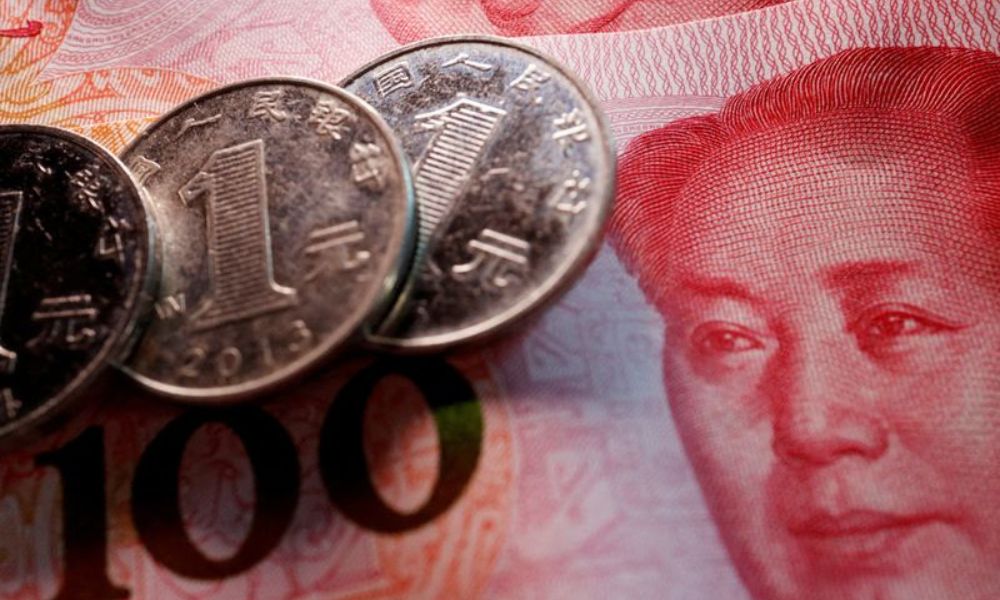
China's major state-owned banks have been active in both onshore and offshore foreign exchange markets in recent weeks to arrest rapid yuan declines. The state banks were spotted mopping up offshore yuan liquidity on Monday, sources told Reuters.
State banks often act on behalf of China's central bank in both onshore and offshore foreign exchange markets, but they could also trade on their own behalf or execute their clients' orders.
| Are you a Tax Lawyer in USA? 👉Transform Your Brand: Click for Metamorphosis👈 |
China's yuan has lost more than 5% against the dollar to 7.2846 per dollar, becoming one of the worst performing Asian currencies. [CNY/]
Following is a list of policy moves and measures to stem yuan weakness after the local currency weakened past the closely watched 7-per-dollar level in May:
The People's Bank of China (PBOC) continued its weeks-long trend of setting the yuan midpoint firmer than market projections, which trader say pointed to Beijing's discomfort over the yuan's recent persistent weakness.
Tuesday's official guidance was 1,105 pips firmer than Reuters' estimate, the biggest such discrepancy during this round of yuan depreciation.
China's major state-owned banks were seen actively mopping up the offshore yuan, sources told Reuters, a move that effectively raised the cost of shorting the Chinese currency.
China's major state-owned banks were seen busy selling U.S. dollars to buy yuan in both onshore and offshore spot foreign exchange markets this week, sources told Reuters.
Offshore branches of the state banks were seen selling dollars during London and New York trading hours this week, according to the sources.
China's yuan moves are broadly consistent with short-term economic fundamentals as well as the market's demand and supply dynamics, Financial News, a newspaper backed by the PBOC, said.
It reiterated that the yuan will basically maintain stable, reasonable and balanced levels in mid- to long-term.
The PBOC will also resolutely prevent risks of the yuan exchange rate overshooting and fend off systemic financial risks, it said in the second-quarter monetary policy implementation report.
China's major state-owned banks were seen selling U.S. dollars to buy yuan in onshore spot foreign exchange market on Wednesday, sources told Reuters.
China has maintained policy continuity and consistency and will continue to maintain the stability of the yuan exchange rate, the country's FX regulator told Reuters.
China's major state-owned banks were seen selling U.S. dollars to buy yuan in both onshore and offshore spot markets in early Asian trade, sources with direct knowledge of the matter said.
The Politburo urged a "proactive" fiscal stance, "prudent" monetary policy, a stable yuan, livelier capital markets, measures to defuse mounting financial risks, and improvements in business and consumer confidence.
China's major state-owned banks were seen selling dollars to buy yuan in the offshore spot market in early Asian trades, sources with direct knowledge of the matter said.
China's central bank and foreign exchange regulator raised the cross-border macro prudential adjustment ratio for corporates and financial institutions to 1.5 from 1.25, making it easier for domestic firms to raise funds from overseas markets.
Financial News, a publication backed by the PBOC, said in a commentary that foreign investors were net purchasers of onshore yuan bonds in June, and expectations in China's foreign exchange market remain stable and cross-border capital flows are basically balanced.
China's major state-owned banks lowered their dollar deposit rates for the second time in a month, sources with direct knowledge of the matter said, as authorities stepped up efforts to arrest a slide in the yuan.
China's major state-owned banks were seen selling dollars for yuan in the onshore spot foreign exchange market, sources with knowledge of the matter said.
China's major state-owned banks were seen selling dollars in the offshore spot foreign exchange market, sources with knowledge of the matter said, suggesting authorities wanted to slow the pace of the yuan's recent slide.
A Chinese self-regulatory body overseen by the central bank asked major state-owned banks to lower the dollar deposit interest rates, sources with direct knowledge of the matter said, in a bid to shore up the weakening yuan currency.
China's commerce ministry asked exporters, importers and banks about their currency strategies and how a weakening yuan could affect their businesses, sources who were part of the survey told Reuters.
China's major state-owned banks were seen selling dollars in the onshore spot foreign exchange market on two days, sources with knowledge of the matter told Reuters.
The yuan is unlikely to experience sharp volatility as China's economic fundamentals, balance of payments and foreign exchange reserves are generally stable, the state-run Economic Daily said.
China will resolutely curb large fluctuations in the exchange rate and study the strengthening of self-regulation of dollar deposits, the central bank said.
It said that it will guide expectations, correct pro-cyclical and one-sided behaviour when necessary, and curb speculation.
(Source)